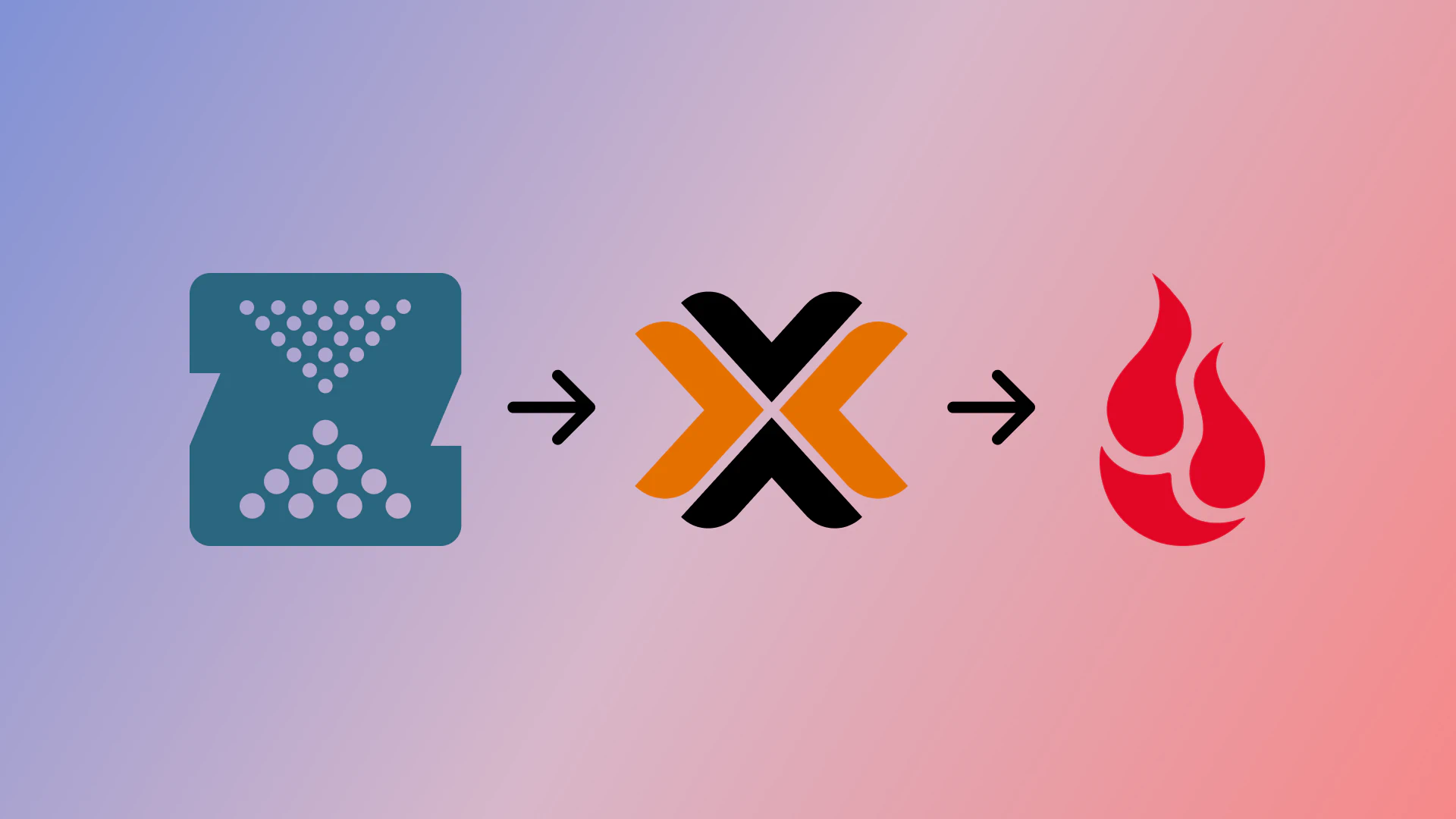Recently I finally implemented a good backup strategy and went with Proxmox Backup Server and Backblaze as my backup targets. I have a ZFS pool on my Proxmox host which I use for my file storage. I did that with the guide from apalrd. The data on there needed to be backed up. Here is how I did it:
I want to backup some ZFS datasets to my Proxmox Backup Server which will then backup all its data to Backblaze. The data Backblaze receives should also be encrypted since I do have all my important documents in Paperless-ngx which saves its data to that ZFS pool. Because the dataset where the Paperless data resides is encrypted at rest, the backup to PBS should be too.
- Backup ZFS datasets to PBS
- Encrypt the backup so that PBS cannot read it
- Backup the PBS datastore to Backblaze, this also needs to be encrypted
Backing up from the source, so the ZFS datasets, to Proxmox Backup Server is
relatively simple. Just install the proxmox-backup-client and you are good to
go. But hold on, what if the data is being written to while the backup is in
process? For that I wrote a simple bash script which will first create a
snapshot, from which the backup client will then create its backup.
#!/bin/bash
# function to delete left over backup snapshots
function delete_pbs_snapshots {
# list all snapshots
output=$(zfs list -t snapshot -o name -H)
for snapshot in $output; do
# isolate the snapshot name from the dataset name
snapshot_name=$(echo $snapshot | sed "s|.*@||")
# if the snapshot begins with pbs_ delete it
if [[ $snapshot_name == "pbs_"* ]]; then
echo "Deleting snapshot: $snapshot"
zfs destroy $snapshot
fi
done
}
delete_pbs_snapshots
# the datasets to be backed up
datasets=("somepool/archive" "somepool/another-dataset")
snapshot_locations=()
# for each dataset configured create a new snapshot to read off of
for dataset in "${datasets[@]}"; do
# format the snapshot name
snapshot_name="pbs_$(printf '%(%Y-%m-%d_%H:%M:%S)T')"
snapshot_path="$dataset@$snapshot_name"
echo "Creating snapshot: $snapshot_path"
zfs snapshot "$snapshot_path"
# add the full path of the snapshot the array
snapshot_locations+=("/$dataset/.zfs/snapshot/$snapshot_name")
done
# backup locations for pbs client
backup_cmd=""
# add each snapshot to the backup locations
for snapshot in "${snapshot_locations[@]}"; do
# get the dataset path
dataset_path=$(echo "$snapshot" | sed "s|/.zfs/snapshot/.*||")
# add the dataset to the locations being backed up
# saving as datasetname.pxar
backup_cmd="$backup_cmd $(echo ${dataset_path:1} | tr '/' '-').pxar:$snapshot"
done
# username, server, location, password for pbs
export PBS_REPOSITORY='root@pam!zfs-backups@pbs.vlan.party:backups'
export PBS_PASSWORD="userPasswdOrApiKey"
echo $backup_cmd
# backup to pbs in the somepool namespace using metadata as a change detection
proxmox-backup-client backup $(echo $backup_cmd) --ns somepool --change-detection-mode=metadata
delete_pbs_snapshotsAfter saving this script in a location like /opt/pbs-backup/backup-to-pbs.sh
and making it executable (chmod +x backup-to-pbs.sh) you can execute it with
a systemd service and timer.
[Unit]
Description=Backup ZFS datasets to PBS
Requires=zfs.target
After=zfs.target
[Service]
Type=oneshot
ExecStart=/opt/pbs-backup/backup-to-pbs.sh[Unit]
Description=Run PBS backups one a week
[Timer]
OnCalendar=Sun 00:00
Persistent=true
[Install]
WantedBy=timers.targetUsing systemctl daemon-reload and systemctl enable pbs-backup.timer --now
your ZFS datasets will be backed up at 12:00 AM every Sunday to your Proxmox
Backup Server.
To encrypt backups before sending them to PBS you can use an encryption key. To create it enter the following command.
# this will create a new default key with no password
# . if you want to password protect it remove the kdf flag
# . you can use PBS_ENCRYPTION_PASSWORD in your backup script to enter the password
proxmox-backup-client key create --kdf nonepaperkey) which you can read about
here.
Now that your data is stored on the Proxmox Backup Server it’s time to back that up to Backblaze. We’ll use Rclone for that since it has all the features we need.
Install Rclone on your PBS server.
# look at the version distributed through apt here first
# https://rclone.org/install/#package-manager
apt install rclone
# if you need a newer version use a different method of installationUsing rclone config you can now configure your Backblaze bucket. Look
here for further reference.
For encryption we’ll use the crypt remote from Rclone which will layer on top of
another remote and encrypt the files and filenames. Use rclone config, adding
another remote once again and using crypt as the storage type. Look
here for further reference.
rclone.conf. If you do not have them
handy you won’t be able to restore from Backblaze!Your .config/rclone/rclone.conf should now look something like this:
[Backblaze]
type = b2
account = yourAccountId
key = yourKey
hard_delete = true
[EncryptedBackblaze]
type = crypt
remote = Backblaze:backblaze-bucket
password = someRandomChars
password2 = someOtherRandomCharsTo start your first sync you can run the following command. Note that the number of concurrent transfers is dependent on your number of CPU cores, available RAM, and upload speed.
# /mnt/datastore/backups should be replaced with your datastore location
rclone --verbose --fast-list --update --transfers 16 sync /mnt/datastore/backups/ EncryptedBackblaze:Depending the datastore size and internet speed this can take a few hours, so it
might be better to run this command with screen so that you can leave the
session and not interrupt the upload.
After the first sync is done you can create a systemd service and timer to automatically back up the datastore. This will be done much quicker since PBS is very great at deduplicating data.
[Unit]
Description=Backup /mnt/datastore/backups to Backblaze B2 Cloud Storage
[Service]
Type=oneshot
ExecStart=/usr/bin/rclone --verbose --fast-list --update --transfers 16 sync /mnt/datastore/backups/ EncryptedBackblaze:[Unit]
Description=Run Backblaze B2 Sync once a week
[Timer]
OnCalendar=Mon 00:00
Persistent=true
[Install]
WantedBy=timers.targetAfter running systemctl daemon-reload and
systemctl enable backblaze-rclone.timer --now your datastore will be backed up
every Monday at 12:00 AM.
Now you are done! You have now successfully backed up your data to the cloud. Just make sure that you have all encryption keys and passwords kept at a safe place you can access in case your disks go belly up.
